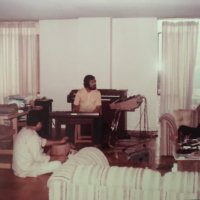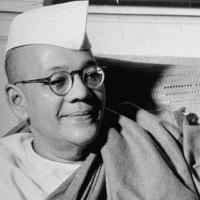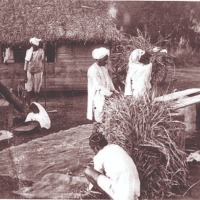The literary world has failed miserably, once again, to commemorate one of the greatest writers of world literature on his birthday, observes Rajesh Sinha.

The visionary author, Eric Arthur Blair, better known by his pen name, George Orwell, was born on June 25, 1903 in Champaran, a village in the district of Motihari in Bihar, India, but even after one hundred and seventeen years, he continues to remain neglected in his birthplace, which once again forgot, very much like every year, to pay tribute to him.
The writer lived a relatively varied and interesting life. Born in India to a British father (an official of the Indian Civil Services, who worked in the Opium Department in British India) and a French mother, he was taken to live in England when he was just a year old. He studied at Eton. It would have been easy to settle into a comfortable life, but instead, he pursued unusual experiences that took him around the world. He served as a policeman in Burma, held a number of odd jobs in different places (including that of a dishwasher and a tutor to a mentally-challenged child). He also spent time being a bum in Paris and a tramp in London and was considered an unsuccessful poet. He did all this before he reached the age of thirty.
During the remaining seventeen years of his life, he worked in book stores, dabbled in farming, fought in the Spanish Civil War and did broadcast reporting for the BBC during the Second World War. Success as a writer came to him late in life. He died in 1950, at age 46, after becoming ill and spending his final days in a hospital bed.
Orwell was more Gandhian than he would ever be considered simply because he was not an Indian. However, he himself, having been born in the country, considered himself Indian and proudly claimed this. It is truly unfortunate that we have not been able to recognize his great love for this country and claimed him as our own.
In his essay, “Reflections on Gandhi”, Orwell wrote, “Saints should always be judged guilty until they are proved innocent, but the tests that have to be applied to them are not, of course the same in all cases. In Gandhi’s case the questions one may feel inclined to ask are: to what extent was Gandhi moved by vanity – by the consciousness of himself as a humble, naked old man, sitting on a prayer-mat and shaking empires by sheer spiritual power – and to what extent did he compromise his own principles by entering politics, which of their nature are inseparable from coercion and fraud? To give a definite answer one would have to study Gandhi’s acts and writings in immense detail for his whole life was a sort of pilgrimage in which every act was significant”.
He concludes the essay by writing, “In comparison to other leading political figures of our time, how clean a smell [Gandhi] has managed to leave behind.”

Orwell’s emotional association with Champaran never ended. “‘I am an Indian – I was born there,’ as if it was a pleasure for him to repeat this,” writes Jay Dubashi, who was an officer with the Indian High Commissioner’s office in England and among the few regular visitors that Orwell had while undergoing treatment during his last days at the University Hospital at Russel Square, London, from 1949 to 1950.
The dilapidated condition of the house where Orwell was born and where he lived as infant and the similarly poor state of the opium warehouse where his father was posted as a deputy agent, tells a sad tale of continuous neglect of this heritage site by successive governments.
This place in Motihari was amongst the four important heritage sites in Bihar adopted by Dr L.M. Singhivi’s Heritage Foundation, New Delhi. Due to the inordinate delay in transferring the land to the Heritage Foundation by the district administration, however, neither the Heritage Foundation nor the district administration could undertake the construction work for renovation of the site. The funds allocated for the work too could not be utilized. This is a shame considering that in 2005, during Dr Singhvi’s lifetime, even the Prince of Wales had taken an interest to the project in turning Orwell’s birthplace into an international heritage site.
Later, in 2013, a section of local political leaders tried to make mileage out of the issue in order to gain the support of intellectuals, who have often raised the issue of renovation of the heritage site. A cursory attempt was made to try to transfer the land for renovation but seven years later, that too seems to have yielded no result.
A few years ago, the local Rotary Lake Town Club tried to join the struggle to have the heritage site reinstated to its former glory, but in vain.

And so, another year has gone by and thoughts of honouring the birth of a genius who penned such insightful novels as Nineteen Eighty-Four and Animal Farm which brought us into the future predicted by him, remains a distant dream.










Thank you very much for the good display of article.
LikeLike